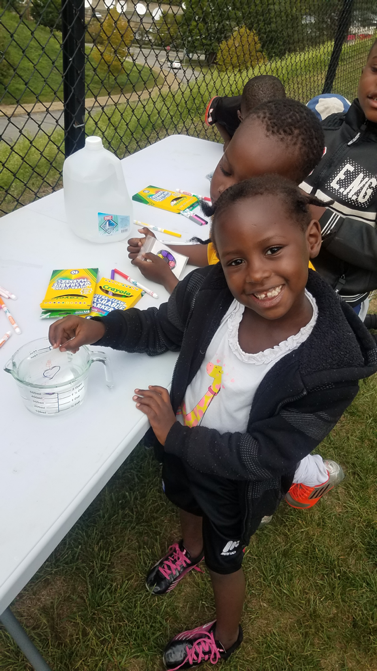Scoring a Goal with STEM
Integrating Science into Sport-based Youth Development
Sarah Werner, a Ph.D. candidate in the Hiller lab, was awarded the Department of Biological Sciences Margaret Carver Award for Diversity, Equitability, and Inclusion in 2020 to fund her science outreach goals. Werner partnered with Justin Forzano, Founder and CEO of Open Field, a program for youth which aims at developing leadership and providing skills for students to succeed in school, higher education, and in the workforce. The participants are refugees from Africa and the Middle East. Open Field is a sport-based youth development organization using soccer to make a difference in the lives of youth from low resource communities. Werner is working to incorporate STEM learning alongside life skills learning that happens on and off the field.
In Fall 2020, Werner and Forzano launched Soccer and Science (S2) in the greater Pittsburgh community. Soccer and Science brought fun, easy, interactive science experiments to children of refugees and immigrants. Throughout the fall semester, Werner attended one of the Open Field soccer sessions every week and led a small group of the children through fun, short, and easy science experiments in about 15-25 minutes in conjunction with their soccer practice. Activities were designed to engage children in science, encourage scientific thinking and curiosity, and mentor the participants as they learned fun elements of science. The children spanned a wide age range: the core group was between 5-14 years of age, with several children bringing younger siblings, some of whom were toddlers. As a pilot, Werner had to cap the program at 12 students. The program was optional, and children who joined were eager to participate.
Kids delighted in making lava lamps and creating rainbow-bridges in water. A favorite may have been using litmus paper to make a vinegar and baking-soda volcano, which exploded in a cloud of glitter. Every experiment was designed to be safe, fun, and in many cases, was brought home to keep. Students explored density, microbes, hygiene, light refraction, chromatography, capillary action, gas reactions, the pH scale, and polymerization. Through thoughtful questions and volunteering to set up and packing up experiments they developed a relationship with Science and with Werner. Through working together they matured their collaborative and leadership skills.
This spring Werner is partnering with ARYSE Pittsburgh to remotely teach science to some of the same students. Her goal is to provide continuity and support and strengthen their scientific knowledge. Soccer and Science will resume in the summer of 2021. Werner and Forzano hope to grow the program to include more volunteers, more students, and expand topics and age groups. Werner, Forzano, Hiller and the Department of Biological Sciences plan on working together to expand S2 and hope to see this collaboration translated into increased opportunities for these students’ education and their experience in the workforce.
